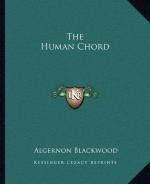Now Spinrobin was well aware that the continued repetition of one’s own name can induce self-hypnotism; and he also knew that the reiteration of the name of an object ends by making that object disappear from the mind. “Mustard,” repeated indefinitely, comes to have no meaning at all. The mind drops behind the mere symbol of the sound into something that is unintelligible, if not meaningless. But here it was altogether another matter, and from the torrent of words and similes he uses to describe it, this—a curious mixture of vividness and confusion—is apparently what he witnessed:
For, as the clergyman’s resonant voice continued quietly to utter the name, something passed gradually into the appearance of the motherly old housekeeper that certainly was not there before, not visible, at least, to the secretary’s eyes. Behind the fleshly covering of the body, within the very skin and bones it seemed, there flowed with steady splendor an effect of charging new vitality that had an air of radiating from her face and figure with the glow and rush of increased life. A suggestion of grandeur, genuine and convincing, began to express itself through the humble domestic exterior of her everyday self; at first, as though some greater personage towered shadowy behind her, but presently with a growing definiteness that showed it to be herself and nothing separate. The two, if two they were, merged.
Her mien, he saw, first softened astonishingly, then grew firm with an aspect of dignity that was unbelievably beautiful. An air of peace and joy her face had always possessed, but this was something beyond either. It was something imposing, majestic. So perilously adjusted is the ludicrous to the sublime, that while the secretary wondered dumbly whether the word “housekeeper” might also in Skale’s new world connote “angel,” he could have laughed aloud, had not the nobility of the spectacle hinted at the same time that he should have wept. For the tears of a positive worship started to his eyes at the sight.
“Sarahmawle ... Sarahmawle....” The name continued to pour itself about him in a steady ripple, neither rising nor falling, and certainly not audible to those deaf old ears that flanked the vigorous and unwrinkled face. “Youth” is not the word to describe this appearance of ardent intensity that flamed out of the form and features of the housekeeper, for it was something utterly apart from either youth or age. Nor was it any mere idealization of her worn and crumpled self. It was independent of physical conditions, as it was independent of the limitations of time and space; superb as sunshine, simple as the glory that had sometimes touched his soul of boyhood in sleep—the white fires of an utter transfiguration.
It was, in a word, as if the name Skale uttered had summoned to the front, through all disguising barriers of flesh, her true and naked spirit, that which neither ages nor dies, that which the eyes, when they rest upon a human countenance, can never see—the Soul itself!




